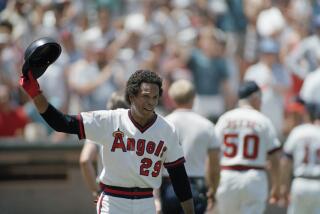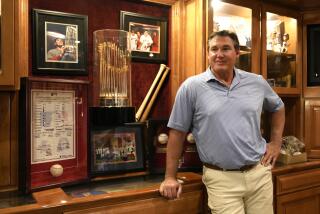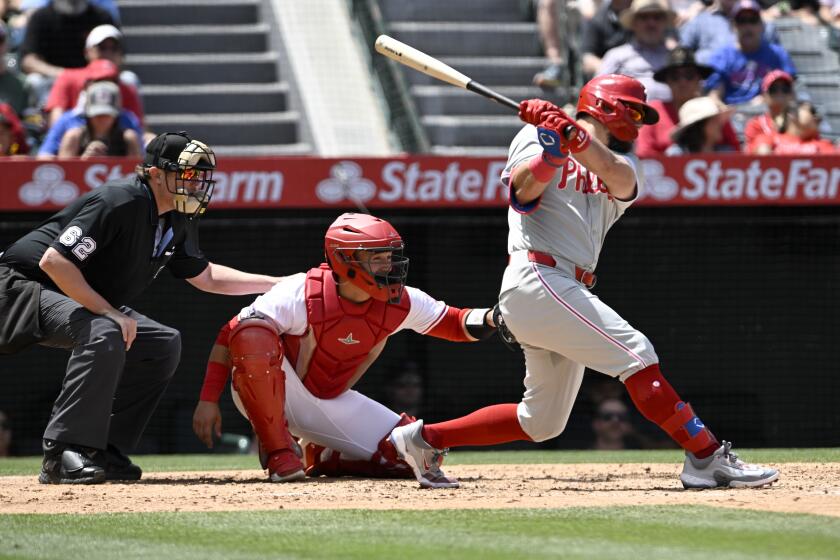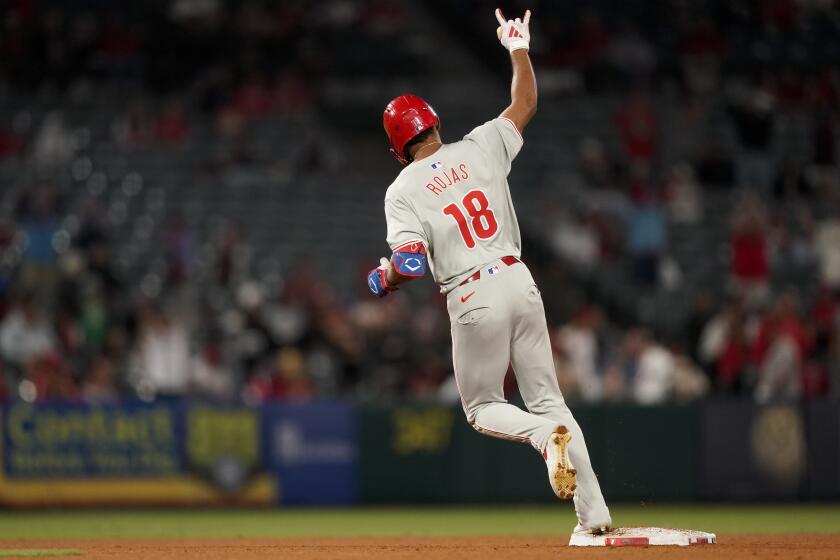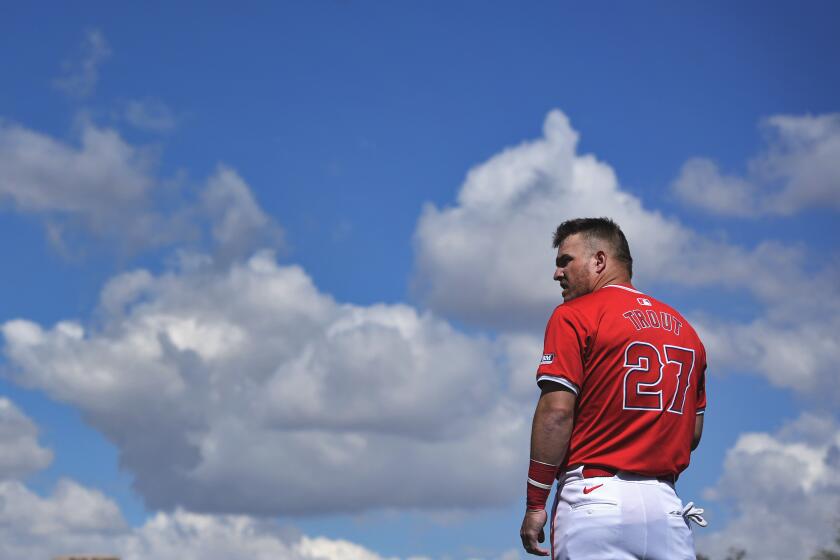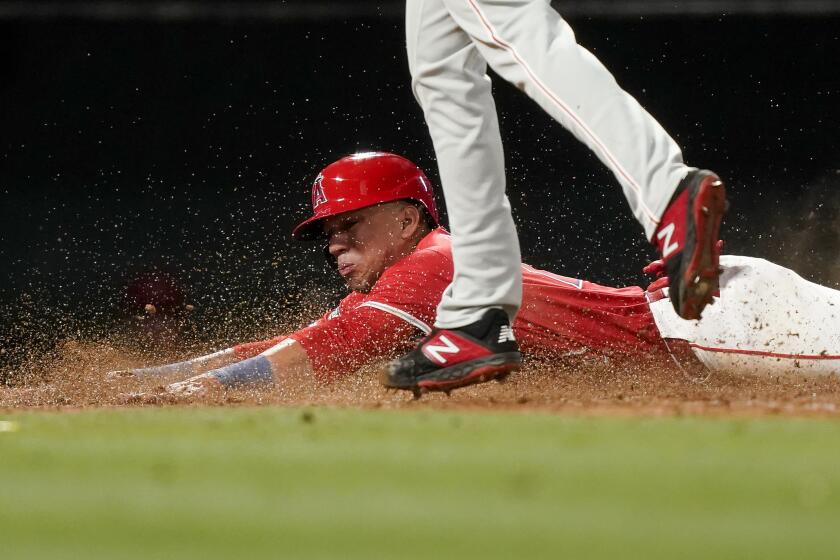When ‘A’ stood for average
Jim Abbott started his career with the Angels at a time when their halo was all but invisible. They won some games and they lost some games, but the playoffs always went on without them, not that most sports fans in Southern California bothered to notice.
“I was never on a team where I felt the team was going to win it all,” Abbott said.
The lean years have long passed, buried under a tidal wave of red, a succession of talented teams capable of winning the World Series and a growing collection of division championship banners. The Angels added another one Wednesday, clinching their fourth American League West title in five years.
For the thousands of fans who lingered in their Angel Stadium seats, waiting more than an hour after the game had ended for the chance to celebrate with the players, victory was sweet, even if a season without the playoffs would have been unsatisfactory.
But, for the players who wore the halo during the lean years when it was associated with mediocrity and apathy, the emergence of the Angels as a perennial World Series contender is nothing short of shocking.
“It’s really been an amazing transformation for the organization,” Tim Salmon said.
“The Angels are like the Red Sox and the Yankees. They’re the team you expect to be there every year.”
In fact, barring a miracle comeback from the Yankees in the next three weeks, the Angels will be the only team in the major leagues to win four division championships in the last five years.
When the Angels qualified for the playoffs in 2002, for the first time in 16 years, they needed the wild card to get there, as plucky underdogs.
“When they got in in ‘02, it seemed like such a great coup, that the door had finally been busted down,” said Abbott, who played for the Angels in 1989-92 and again in 1995-96.
“Now that doesn’t seem enough.”
What was once elusive has become routine.
In their first 43 years, the Angels won three division championships, never finishing with a winning record in more than two consecutive seasons. The Angels now have clinched not only another AL West title but their fifth consecutive winning record.
The Dodgers, for so long the standard of sports excellence in Southern California, posted a winning record in 10 consecutive seasons, from 1969 to ’78. They have won five World Series championships here, to the Angels’ one. But, for all their success, they have never made four playoff appearances in five years in Los Angeles, or five in seven years.
The Angels’ alumni trace the turnaround to 1999, when the Walt Disney Co. owned the team. Disney disgraced itself by dressing the Angels in periwinkle and putting cheerleaders atop the dugout roof, but the company distinguished itself by hiring Bill Stoneman as general manager.
Stoneman hired Mike Scioscia as manager, and the two overhauled the organization to focus on pitching, defense and the minor leagues.
“The key to being a great owner is to have great baseball minds around you,” said Wally Joyner, who played for the Angels from 1986 to ’91 and again in 2001.
Arte Moreno, the first Latino to own a major sports franchise in the United States, bought the team in 2003. He retained Stoneman and Scioscia rather than hire executives he could call his own, then set about remaking the image of the franchise.
In his first foray into free agency, he signed outfielder Vladimir Guerrero, who would win a Most Valuable Player award, and pitcher Bartolo Colon, who would win a Cy Young Award.
Since then, even as the Angels’ minor league system has flourished, Moreno has maintained one of the league’s highest payrolls.
“Everybody wants to play for an owner who says, ‘I’m putting it all out. Let’s win,’ ” said Salmon, who played for the Angels from 1992 to 2006.
“That’s something you dream about.”
Moreno financed the large payrolls in part by marketing the team to all of Southern California, increasing television revenue, buying his own radio station and ultimately identifying his team with Los Angeles rather than Anaheim.
“He reached out to everybody who wants to be a fan,” said Joyner, now a coach for the San Diego Padres. “I’m sure there are a lot of fans close to San Diego that enjoy the Angels.”
Said Abbott: “He had a large-market vision for the team. Whether you agree with the Los Angeles name or not, it was a bold move.
“He’s brought that type of mentality to the Angels: We don’t have to take a back seat to anybody.”
Under the previous ownership -- of Disney and, previously, of the Autry family -- the Angels’ marketing tended to focus on Orange County, with Los Angeles ceded to the Dodgers, and to the notion that fans who could not easily drive to a game would not root for the team.
“I hate to use the words ‘small market,’ but that’s what we were tagged with,” Salmon said. “We were the small-market team that was always trying to get over the hump.
“You almost started believing that, until the new regime came in.”
Now Salmon sees Angels gear in Arizona, where he lives. Abbott spotted two fans wearing Angels shirts on a flight to Minnesota this week. Chuck Finley, who played for the Angels from 1986 to ‘99, catches the halo everywhere.
“Down South, on the East Coast, on music videos,” Finley said. “Man, they really have come around.
“I wish, when I was playing, that our ownership had a little more of an open mind about marketing the team.”
The Angels sold more than 3 million tickets this year, for the sixth consecutive year. They opened for business in 1961, yet they never had sold 3 million tickets until Moreno bought the club.
None of this matters, of course, if the Angels do not win. They do now, thrilling their alumni.
“I’m very proud I was part of that organization,” Salmon said. “They’ve gained credibility and respect around the league. Everybody recognizes it’s one of the better organizations in baseball.”
Times staff writer Mike DiGiovanna contributed to this report.
--
More to Read
Go beyond the scoreboard
Get the latest on L.A.'s teams in the daily Sports Report newsletter.
You may occasionally receive promotional content from the Los Angeles Times.

